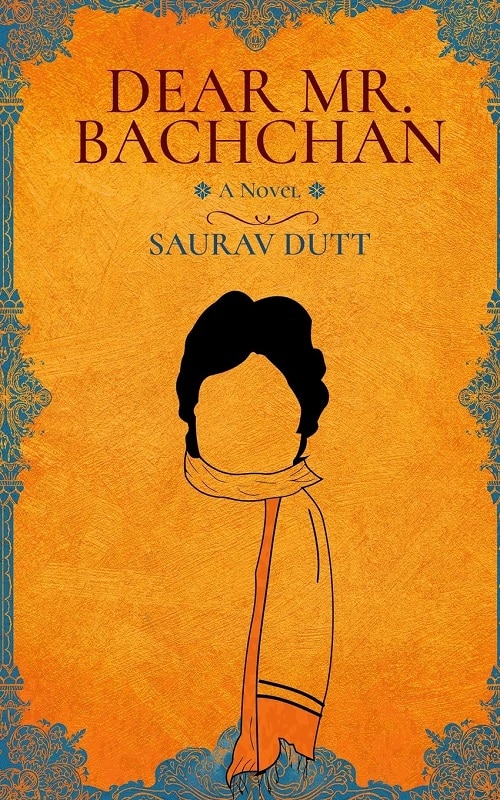PLOT: 3/5
CHARACTERS: 3/5
WRITING STYLE: 3/5
CLIMAX: 3/5
ENTERTAINMENT QUOTIENT: 3/5
Almost a tribute to Amitabh Bachchan yet not quite so, the book, “Dear Mr Bachchan” genesis rested in Saurav Dutt’s reading about a family who resides in the town of Ayodhya in India. They had no cable connection, and all the access that they had to the world of cinema was through the iconic Doordarshan, which was India’s only broadcaster at that time.
The story of “Dear Mr Bachchan” is set in those times when technology was yet to equip people with the facilities that it has in today’s India. Hence, the urban-rural divide ran deep. But what united a cinema loving country was a figure named Amitabh Bachchan.
The novel is told from the perspective of a twelve-year-old boy. His father has just been killed in the heart of Mumbai, near his house at Dharavi. The boy is a die-hard Amitabh Bachchan fan and watches every film the actor is in. This is despite the taunts of his mother, who feel that they should have nothing to do with imaginary people doing things in imaginary circumstances.
The boy connects real people to characters played by Amitabh Bachchan in movies. This gives him a false sense of hope that his father may rise back to life despite having been run over by a speeding car. Similarly, the roles played by Amitabh Bachchan in films that show him rise from a low position in society to a high position helps the boy to dream big about one day making it through the poverty that he lives in. His obsession with movies makes him dream of becoming a film actor when he grows up.
A twist in the plot takes place when the boy learns from his mother’s employer’s eight-year-old son to write a letter to Amitabh Bachchan in English. This does two good things for him. It helps him learn English and instils in him the confidence to one day hand over the letter to Amitabh Bachchan at the darshan that takes place at the actor’s house every Sunday. Will he succeed in his efforts to meet one of the stalwarts of Indian cinema or will his hopes be dashed?
The plot twist with the letter and subsequent visits to spot Amitabh Bachchan make the novel interesting and innovative. The storyline may seem simple, but it is how it is relayed that adds to the entertainment quotient of the reading process. From the preface to the last chapter, each flows seamlessly into the other in a chronological manner.
A coming of age story runs parallel to the rise of a cinema superstar. Both these tales get intertwined at a point after which the story picks up pace. It can be simplified as a boy, Bachchan, and Bollywood saga but that of course will be a coarse summation.
“Dear Mr Bachchan” has a lot more to offer in terms of being a tale of paradoxes such as a young boy’s innocence pitched against the bitter realities of social inequalities, the glamour surrounding a cinema superstar who portrays larger than life characters as opposed to his inner dilemmas, to name a few.
The language of “Dear Mr Bachchan” is simple and straight forward. The vocabulary is easy to follow, and there is an apt choice of words as and when required. This makes the book an accessible read to readers who may be at a beginner’s level. There are dialogues every now and then between different characters, though the story opens in the first-person narrative told through the eyes of the boy.
The book is realistic in the sense that it does not glorify Amitabh Bachchan to an otherworldly status. It depicts him as a man who has achieved a lot in the world through his determination and hard work, which is what the boy aspires towards.
The book becomes rather dense with too many smaller characters crowding the incidents in an otherwise episodic story. What the text captures well is the innocence of a boy of twelve. It may seem to readers a bit unbelievable for a boy living in squalor to not understand the darker sides of life.
The story picks up and describes the juncture when the young boy is slowly beginning to broaden his horizons of understanding the world around him. Cinema becomes a source of motivation for him. Its passionate dialogues give him the courage and determination to work his way up the social ladder.
There is a constant use of names of real people and places throughout the book. It would have been more interesting had those names been replaced by fictional parallels. That would add to the twists in the story.
The cover is rather bland and minimalistic, making the image of Amitabh Bachchan a reference to any persona of a risen cinema superstar, and not likely to hint at the real personality regardless of fictional similarities drawn.
On the whole, “Dear Mr Bachchan” is conceptually new and makes for an engaging read. It will especially appeal to lovers of the Indian film industry, young adults, Amitabh Bachchan fans, and those who enjoy stories with a plot twist.
Can’t wait to read it? Buy your copy of “Dear Mr Bachchan” using the link below.
